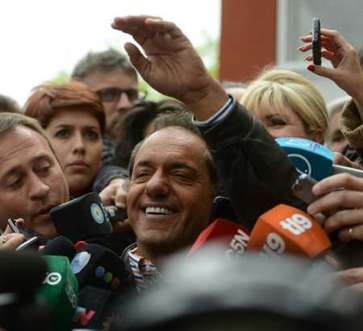Argentine Presidential Vote Heads to Runoff

Argentina's presidential election is headed for a November 22 runoff between incumbent Cristina Kirchner's chosen successor Daniel Scioli and conservative rival Mauricio Macri, partial results indicated Monday.
The two candidates were neck-and-neck with around 35 percent each, with just over 86 percent of polling stations reporting -- though results were still pouring in from Scioli's stronghold, Buenos Aires province, where he has served as governor for the past eight years.
Scioli, a 58-year-old powerboating fanatic who lost his right arm in a 1989 racing accident, was considered the front-runner heading into the vote.
However Macri sounded a triumphant note over the early results that put them at near equal footing.
"What happened today changed the country's politics," Macri, the 56-year-old mayor of Buenos Aires, said in a euphoric speech to supporters before busting out his cumbia dance moves on stage.
"The challenges aren't easy, but I have faith in myself," he said.
Opinion polls had indicated Scioli was on the cusp of winning outright, but the race proved to be far closer than predicted.
The runoff will be the first ever in the South American country, which adopted a two-round presidential election system in 1973 but has never had a race go all the way to the second round.
Under Argentine electoral law, in order to win outright, a candidate must claim more than 45 percent of the vote, or at least 40 percent with a margin of 10 points over the runner-up.
Earlier, Scioli acknowledged the race was headed for a runoff as both sides awaited the official results.
"I call on all undecided and independent voters to bring a victory for all Argentines," he said in a speech to thousands of supporters at his campaign headquarters.
"I'll face this new phase with more faith than ever."
Third-place candidate Sergio Massa won 21 percent of the vote.
A former Kirchner ally, Massa fell out with the president and launched a rival party, the Renewal Front, two years ago.
- Divisive legacy of 'kirchnerism' -
The race draws a curtain on 12 years under Kirchner and her late husband and predecessor Nestor.
Their legacy of trade protectionism, social welfare and defense of the working class -- as well as a highly combative political style -- is deeply divisive in Argentina.
Scioli, a self-described centrist, has vowed to uphold the core of "kirchnerism."
But he has also promised a change in style to attract more investment and increase productivity.
Macri, a former football executive who rose to prominence with a trophy-encrusted reign at Argentina's most popular club, Boca Juniors, has vowed to put an immediate and decisive end to the Kirchners' hallmark policies.
Nestor Kirchner came to office in 2003, in the aftermath of a devastating economic crisis that triggered what was then the largest sovereign debt default in history.
He presided over a stunning turnaround underpinned by average economic growth of more than eight percent a year.
He handed power to his wife in 2007. They were widely expected to continue their term-for-term tango, but Nestor died of a heart attack in 2010.
Cristina, a fiery former senator, won re-election in 2011.
As she cast her ballot, the 62-year-old leader said she was proud to be handing over a "normal" country.
"In the past, we've always voted in the middle of crisis," said Kirchner, who leaves office with an approval rating of around 50 percent after serving the limit of two consecutive terms.
But the economic magic of the early Kirchner years has faded.
The next president will inherit a country troubled by inflation, an overvalued currency and an economy facing what the International Monetary Fund predicts will be a 0.7 percent contraction next year.
Argentina, Latin America's third-largest economy, after Brazil and Mexico, is also still waging a messy legal battle with two American hedge funds that reject its plans to restructure the $100 billion in debt it defaulted on in 2001.
The firms, which Kirchner condemns as "vulture funds," successfully sued for full payment in US federal court. Kirchner's refusal to pay them pushed Argentina into a new default last year.



